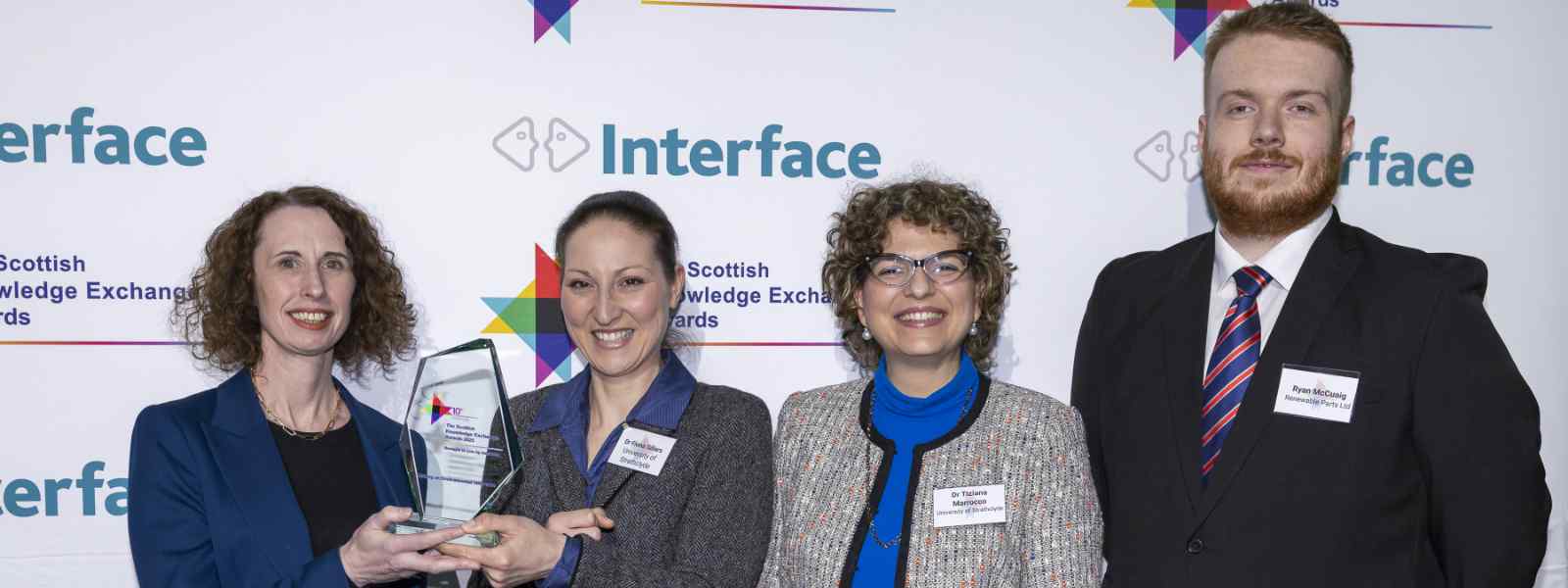
The University of Strathclyde has scored a major success in the Scottish Knowledge Exchange (KE) Awards, with wins in five out of the 10 categories.
Strathclyde won as a partner in three projects, with individual winners in the Innovator of the Future and Knowledge Exchange Champion categories.
Valuable links
The awards underline the importance the University places on KE, Innovation and Knowledge Transfer Partnerships (KTPs), which create valuable links between higher education, business and industry.
The Strathclyde winners, announced at an event at the Edinburgh Futures Institute, were:
• Innovation of the Year – SolarSub Ltd, in collaboration with the National Manufacturing Institute Scotland (NMIS) at Strathclyde, for refining the design of a solar panel cooling system and optimising it for manufacturing and scalability. In partnership with Heriot-Watt University, the technology also underwent rigorous field trials to evaluate its performance under extreme heat conditions, ensuring its robustness and efficacy
• Innovator of the Future – jointly won by KTP Associates Dr Dayi Zhang and Matthew Gibson, both based in Strathclyde’s Department of Electronic and Electrical Engineering (EEE). Dr Zhang worked with Inspectahire Instrument Co to develop a portable, non-invasive ultrasonic device that revolutionises whisky cask monitoring. The device enhances safety, reduces costs, and minimises carbon emissions, aligning with net zero goals. Matthew worked with Ailsa Reliability Solutions Ltd to create the next generation of data-driven condition monitoring solutions for the oil and gas sector. This project is developing the Vision© reliability platform and has demonstrated reduced machine downtime and energy waste, in pursuit of net zero and sustainable engineering processes
• Knowledge Exchange Champion – Professor John Bachtler, Director of Strathclyde’s European Policies Research Centre (EPRC). John has transformed Scotland’s regional policy knowledge exchange through 40 years of leadership at EPRC. He advanced policy innovation via networks such as EoRPA and IQ-Net, linking Scotland with European policy frameworks. His strategic insights, mentoring, and impactful KE collaborations strengthened regional development policy, inspired future leaders, and enhanced Scotland’s European policy influence
• Making an Environmental Difference – a collaboration between Strathclyde’s Advanced Materials Research Laboratory (AMRL) and Renewable Parts. This applies circular economy principles within the wind turbine decommissioning process, promoting the refurbishment and remanufacturing of high-integrity, high-value parts in the wind energy sector, instead of them being recycled and returned to raw materials or, worse still, landfill. This circularity approach will have a significant impact on the UK economy and net-zero targets
• Place-based Impact – Digital Dairy Chain. Strathclyde is a partner in this project, which is transforming the dairy sector across the South and West of Scotland and Cumbria. The partnership is driving innovation, enhancing productivity, and stimulating job creation, contributing to sustained economic growth in the region.
Professor Sir Jim McDonald, Principal & Vice-Chancellor at Strathclyde, said: “I am delighted to see the University and our partners enjoying such great recognition at the KE Awards. It is a testament to the excellent work our staff put into high quality knowledge exchange and the deep understanding and expertise they share with our collaborators.
As the range of awards shows, knowledge exchange can take many forms. The work of our winners is helping to accelerate innovation, bringing competitive advantage to industry, promoting sustainable practices and informing policy, as well as supporting economic impact and growth.
Business Minister Richard Lochhead said: “It was good to see the full breadth of academic and business-led innovation on show at Interface’s annual awards. It demonstrated why our expertise in so many sectors is revered around the world, from renewable energy and health technology to food and drink.
Impactful innovations
“Scotland has been at the forefront of many of the world’s most impactful innovations, from the MRI Scanner and penicillin to televisions and telephones. Yet, by combining research and business, so many new and exciting Scottish breakthroughs are just on the horizon and that is something we should all champion.”
Amelia Whitelaw, director of awards organisers Interface, said: “The nominees and winners we are celebrating exemplify how collaboration drives valuable advancements. These partnerships have led to the development of new technologies, products, and services that contribute to economic progress and societal benefit.
“Their innovations are not only transforming Scotland but also have the potential to make a global impact.”